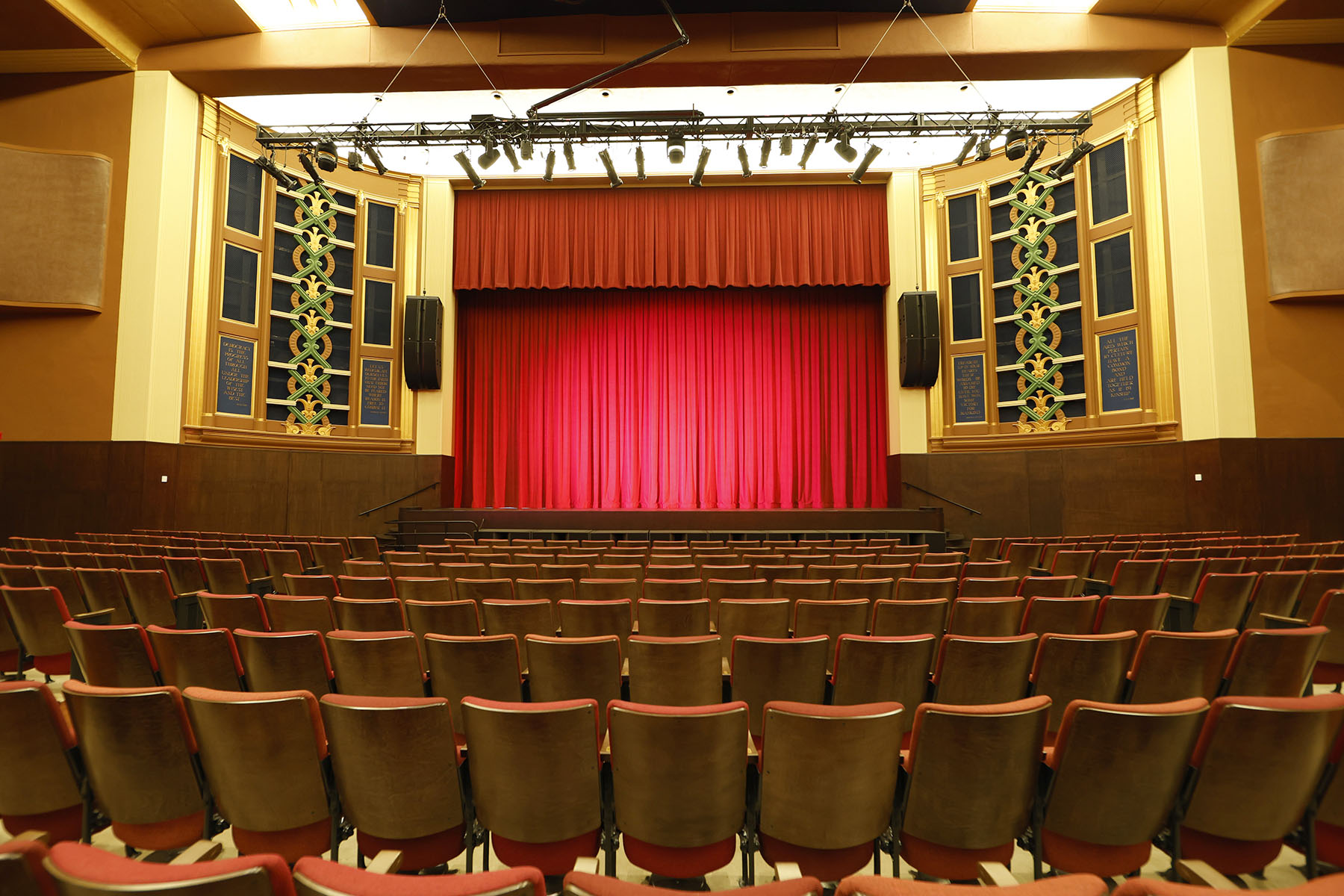Join us as we sit down with our 2023 YDMT Barbizon Lighting Company Jonathan Resnick Lighting Design Award winner, Jaemin Park. In this Q&A, Jaemin discusses his experience with international design, his love for music-accompanied works, and how his path led him to becoming a USITT23 award winner!
How did you get your start in the industry?
I was able to experience lighting and sound industries for the first time in church when I was in high school. However, I never imagined that the experience would make me who I am today.
My undergraduate major was vocal music, not theatre. When I was a sophomore in college, I participated in an opera, Lucia di Lammermoor, as a stage manager. At that time, production leaders wanted me to be a production stage manager rather than performing as a member of a choir because they watched me volunteer with lights and sounds at various events. I think they thought I understood the stage's operating system the best among the students. They thought that I could manage the stage better than other students. It was based on my experiences in high school.
That moment became a turning point in my life. Working as a production stage manager, the back of the stage felt fantastic and dynamic. I think my experience at that time led me to this industry, instead of pursuing a vocalist’s life.
At that time, an opera house with 1,500 seats had opened in my hometown. The Daegu Opera House. They hired many part-time workers. I applied for the lighting section with a bit of experience, and I was hired.
Who have been some of your mentors along the way?
I’ve had two mentors in my time working in the lighting industry.
My first mentor is lighting designer Juho Kim. I was lucky enough to meet him when I started my career in the industry. Through him, I was able to learn how to analyze a script and set the concept. I also learned a lot from him about how to lead the story with lighting and of course, I learned a lot of technical parts of the lighting industry.
I think the most important thing is when someone learns something for the first time. This is because there is a high probability that the routines you first learn will last a lifetime. That is my strength because I learned good things from him, and I still do those things as a routine. Most importantly, I was able to learn the pride of being an artist from him.
I met my second mentor Jakyung Seo when I came to Kent State University four years ago. I learned a lot about paperwork, drafting, and the design processes from her.
I had never learned lighting academically at school until I met her. Since I met her, I have been able to theoretically establish my knowledge to the extent that I could teach at a university.
What inspires you in your design work?
The most inspiring part for me is music. Since I was a music major, I can easily understand music. I have worked as a conductor in the church for a long time. I am very used to reading and analyzing music scores.
Music has no script, but it has many stories. Music encourages my imagination very much. I think being able to imagine something without a script means that I can go beyond the script and create something. Of course, the script is very important. But I also think it's a designer's job to figure out and imagine things that aren't directly in the script.
I believe that art starts by imagining things and I still get a lot of inspiration from music.
Where does your passion for lighting design stem from?
I take pride in being an artist and a lighting designer. When I was working as a lighting designer in South Korea, I met a lot of people who thought that lighting was simply a means of making money. I always told them to be an artist, not a businessman.
Of course, the income part is very important, but it was more important for me to be recognized as an artist. At the time, I did not have much to show them except for my pride. So, I tried to prove it to them. I feel like I have come this far because of those efforts. Perhaps it came from my passion to prove that my argument was the right route.
You are a native of South Korea and have designed more than 100 productions such as plays, musicals, operas, and dances. Do you find international design differs from design in the U.S.?
The goal is almost the same. But the process of getting there is a little different.
When I was in South Korea, I often put more importance on the results than the design process. Of course, no one thinks the process is unimportant in South Korea. It often simplifies the process just for time efficiency. So, there are many cases where the risks that occur on stage are solved at that moment.
Therefore, it is advantageous on stage for those who are quick-witted or have a lot of experience. People with that ability or inclination are likely to be preferred. However, in the U.S., the process seems to be very important. This is also the best way to reduce risk on stage, and I think the probability of creating a more complete work increases. Of course, this may not be common because it is an opinion that comes from my personal experience.
Let us imagine the weather.
Is the sky the same in the UK, Russia, China, and the U.S.? No, it looks different in each area. Even within the U.S., depending on where you’re from, the kind of skylines that you imagine are going to be completely different.
For example, some people will think of beaches, some will think of mountains, and some will think of buildings.
This is a bit of a scientific story, but the sky color of South Korea and the sky of the U.S. are clearly different at sunset. More precisely, the sky in Ohio and the sky in South Korea that I studied were clearly different. The sunset in South Korea is not that colorful of a sky. But Ohio's sky has so many colors. Because of this, designers from different areas have different perspectives and design styles.
I am lucky. As an international student, I have had more diverse experiences, so I have the potential to design more diverse lighting.
While in South Korea, you worked as a full-time lighting supervisor and resident designer at the National Theater. What propelled you to start designing outside of South Korea?
I started studying in the U.S. again rather than starting to design outside of South Korea. I wanted to learn lighting design academically and I was yearning for Broadway.
I came to the U.S. to study lighting design at Kent State University. As soon as the school reopened after the pandemic, I had a chance to design for a new musical there, Chaining Zero. My design for that show was selected for USITT23’s Design Expo and published in the Spring 2023 issue of TD&T.
By designing the musical, it provided me with a chance to design for a show called Passage, produced by Cleveland Playhouse and Case Western Reserve University's MFA acting program. I was nominated for Best Lighting Design of a Play or Musical at the 2022 Broadway World Cleveland Awards for all seven shows I designed during that season, and I had the honor of being the winner for one of them.
Do you have a specific type of show you like to work on?
Rather than specifying it as a specific type of show, I like to design any show with a story. I think many theatre-based lighting designers would feel the same way.
I also have a passion for designing operas. I am an opera major, so I believe that I can understand opera well and I love opera very much.
I am also interested in circus shows with stories. I went to Las Vegas in 2022 to participate in a Live Design International (LDI) show and saw “O” by Cirque du Soleil. It was not the first time I had seen Cirque du Soleil, but nonverbal performances like dance and circus are very interesting to lighting designers. The lighting can reinforce the story.
My goal is to be a designer who can design all types of shows.
What has been your favorite production to design for so far and why?
It's hard to specify what my favorite work is among the works I have designed. I love what I have designed and am proud of myself.
I like music-accompanied works. Whether it's a musical, an opera, or dance. Of course, I can design a play well, but if I want to do something with lighting, a show with music is effective in making a lot of changes.
When I think about it at this moment, I want to design an opera. As a vocal major, I miss opera a lot.
You are currently a lighting designer and an assistant professor at the School of Theater and Dance at Southern Illinois University. Where does your passion for education stem from?
I think my passion for education started with a passion for learning. I had a great desire to learn academically because I did not learn lighting at school.
I studied hard and tried. I wanted to share what I knew. I wanted to be a good reference for people who wanted to learn like me.
This is not limited to the U.S. or South Korea, but I want to expand this idea internationally. I want to show that anyone can learn and teach even if the language is not perfect even if the skin color is different.
If you work to the best of your ability, everyone has a chance.
Any lighting design tips for those interested in that sector of the industry?
See a lot of good shows. That is the beginning of a good design. There is a saying that, "imitation is the mother of creation." It is important to see and feel many good performances and see how the lighting is expressed. It is probably very hard to follow at first. However, you will find a way to express it. That is the reason why we study. Then we get to apply that to what we design. I think that is evidence that you are growing as a designer.
What does winning this award mean to you?
I had a difficult time studying here as an international student, and winning is a reward for that. I believe that this award has increased my chances of designing a show at a higher level.
What is interesting is that I became the first Korean in the field of lighting to be awarded. This will be another challenge and hope for someone.
When I looked at the previous winners' careers of the Barbizon Lighting Company Jonathan Resnick Lighting Design Award, they gave me the courage to challenge myself to a higher level. I have the desire to design like them. It is good motivation. Lastly, I want to be a good motivation to other designers or international students.
Off
Support USITT
For many 501(c)3 nonprofit organizations, USITT included, donations are a lifeline. We are able to continue to expand our online offerings to our Members and to our industry thanks to Membership dollars and the generosity of our donors.







